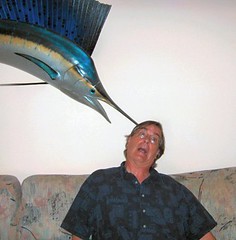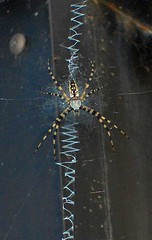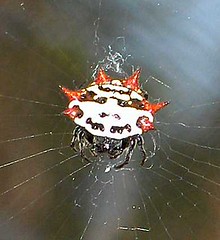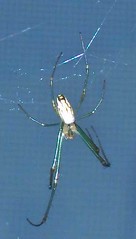They head off to the water's edge to replenish their tans, build up reserves of Vitamin D, and engage in water-oriented activities. When we received an invitation to a party at a friend's house, my wife jumped at it, because they own a sailboat and live on a lake. She grew up sailing, and uses every opportunity to exercise her skills.
She took the boat out with the son of a friend of ours, got 20 feet from shore and hit a sandbar. Here's the son in the water attempting to pull them off. I don't sail, because that would be me pulling the sailboat.

Whenever I go to one of these parties, I always eat too much, and sit around feeling lazy and bloated, and I complain about how full I am.
The owner of the house has a large collection of dangerous-looking fish hanging on the walls. Fortunately, this was only a head wound, so not much damage was done.

A week later, we headed for the beach at Longboat Key near Sarasota on the Gulf of Mexico. Unfortunately, it's Love Bug season here in Florida. Love Bugs are small firefly-like insects that swarm once or twice a year in huge numbers. They immediately find a mate, and join at the genitalia. They fly around, the larger female jerking the male around backwards by his private parts wherever they go. They mate, they lay eggs, then they die by the millions.

If you drive through a swarm of them on the highway, you could die too, because their splattered guts cover the windshield in less than a minute. Windshield-washer fluid is hard to find. The guts of Love Bugs will eat the paint off your car, so some people put those "brassiere" things on their hoods. Other people spray their cars with Pam cooking oil, because it keeps the Love Bug guts from sticking.
They're very thick here at the beach, but not out on the sand, thank God. But they do cover the chaise lounges. Early in the morning, some maintenance guy comes by with a gasoline-powered blower and blows all of the Love Bug corpses away, waking everyone up in the process.

My daughter brought a friend who was celebrating her birthday, so we lit sparklers on the beach.


Normally, this time of year, the ocean is thick with sea birds, diving for baitfish. But the water is calm and placid, and no birds are around. That means bad fishing.

I suspect it's because the fish are all bloated from gorging themselves on swarms of Love Bugs, and they're all laying around on the bottom complaining about how full they are.



